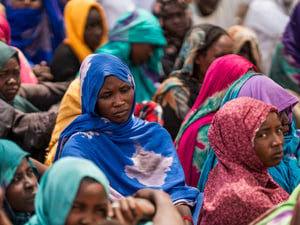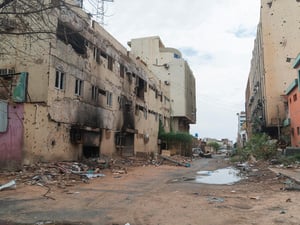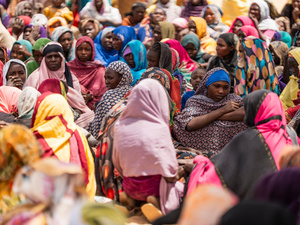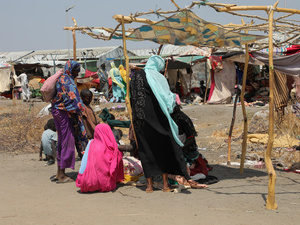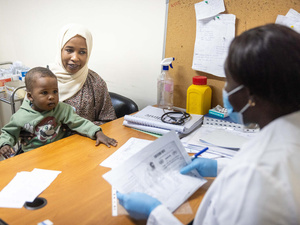UNHCR seeks mass evacuation for foreigners at Tunisia-Libya border
UNHCR seeks mass evacuation for foreigners at Tunisia-Libya border

Thousands of people wait in no man's land in the hope of crossing into Tunisia from Libya at the Ras Djir crossing.
GENEVA, March 2 (UNHCR) - The UN refugee agency and the International Organization for Migration (IOM) have called on the international community to urgently help with a massive evacuation to their home countries of tens of thousands of foreigners stuck at Tunisia's border with Libya.
UNHCR and IOM, in consultation with the Tunisian and Egyptian governments, have established a joint humanitarian evacuation programme and held a first meeting Wednesday in Geneva. Also on Wednesday, High Commissioner for Refugees António Guterres briefed member states of UNHCR's governing body on the proposal. A senior UNHCR official later said "we've had lots of support."
UNHCR and the IOM are asking governments to urgently supply massive financial and logistical assets to their joint evacuation programme, including planes, boats and expert personnel. A UNHCR-chartered aircraft was due to repatriate 177 Egyptians from Tunisia on Wednesday morning, with many more flights planned. The refugee agency was also working with a number of countries to establish air and sea bridges to repatriate people.
On Tuesday afternoon, UN High Commissioner for Refugees António Guterres said Tunisia was struggling to cope with the influx - an estimated 80,000-90,000 people have crossed into the country since February 20 to escape the violence in Libya. Most are migrant workers from Egypt and Tunisia, but many other nationalities are represented.
To date, the number of Libyans known to have fled the crisis in their country exceeds 3,500 and, depending on events, could dramatically increase, Guterres said, adding that the Libyans were being well received in both Tunisia and Egypt.
"I think that we really need a massive evacuation [of Egyptians and other foreigners at the Tunisian border]," Guterres told the British Broadcasting Corporation, in Geneva. He added that there would be "a huge humanitarian disaster" unless solid measures were taken.
"These measures can only be taken with the strong solidarity of the international community. And I would hope that countries would make their own resources available in order to allow for a massive evacuation to take place out of Tunisia," he said.
In a separate message to staff, he said UNHCR was beefing up its emergency teams and expanding the emergency resettlement opportunities to respond to the needs of refugees caught up in the population movement.
Meanwhile, UNHCR continues to be concerned about the welfare of thousands of refugees inside Libya, where national staff from the refugee agency have been continuing to help those they can reach.
"So far, only a handful of the more than 8,000 refugees and 3,000 asylum-seekers registered with UNHCR in Libya are known to have made it out. It is not clear how many unregistered refugees and asylum-seekers are included in the exodus," Guterres noted in his message to UNHCR staff on Wednesday. He also said UNHCR was particularly concerned for sub-Saharan Africans who have become especially vulnerable amid suspicions that they are foreign mercenaries.
Meanwhile, reception and repatriation facilities in Tunisia remain inadequate and the High Commissioner reiterated to staff that "to be able to fully do our work, we need to quickly decongest the border area," where UNHCR has established a transit camp for 10,000-12,000 people. Additional tents were expected to arrive at the border area on Wednesday and Thursday to help double this capacity
On Tuesday night, many people had to sleep rough without shelter from the cold and the rain. Shelter remains the main problem, but UNHCR staff at the border said local people continue to come out in numbers to support the new arrivals, providing them with blankets, food and shelter material.
Meanwhile, UNHCR Goodwill Ambassador Angelina Jolie on Wednesday voiced her strong concern for those fleeing Libya as well as the tens of thousands forced to flee their homes to escape the mounting violence in Côte d'Ivoire.
"As we witness these newest crises unfold in west and north Africa, it is critical that all parties respect the fundamental right of people in danger to flee to safety - whether civilians caught in conflict in their own country or refugees and asylum-seekers caught in new conflicts," Jolie said. "All I'm asking is that civilians be protected, and not targeted or harmed."
Jolie said "the world needs to address this moment. We have to give people safe passage, evacuation if needed, and ensure they have asylum. We don't want to look back and find their deaths are on our hands."

